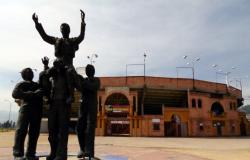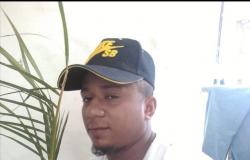In an interview with EL TIEMPO, Sebastian Grundberger, director of the Regional Program Political Parties and Democracy in Latin America of the Konrad Adenauer Foundation, talks about his new book The Pink Galaxy.
In it he explains the challenges for democracy implied by the growth of the previously called pink tide, of which governments from all over Latin America are part. The publication can be consulted for free through dialogopolitico.org/libros
At what point did it go from pink tide to pink galaxy?
The pink tide had an ambiguity as a concept. Because within what is the pink tide there were governments of social democracy, governments like Michelle Bachelet in Chile, Tabaré Vásquez in Uruguay, but the regime of Hugo Chávez, in Venezuela, the regime of Rafael also falls into what is called the pink tide. Correa in Ecuador and Evo Morales in Bolivia. There is an ambiguity there. I propose in the book that from this first moment of the pink tide, a space that I call the pink galaxy has developed today.
Because?
Pink is a continuity of that duality of democratic or democratically legitimized and autocratic actors and the galaxy is because one does not know where it begins and where it ends. Since it is a galaxy, it has many stars, some larger, others smaller, but they are connected like a galaxy to act together. I try to describe some connections of the different stars of this galaxy, but above all the way in which that galaxy acts and that is my thesis to promote authoritarian narratives that undermine, in the end, democratic functionality in Latin America.
Sebastian Grundberger, director of the Regional Program Political Parties and Democracy in Latin America of the Konrad Adenauer Foundation
Photo:Laura Dussán. TIME
What role does the São Paulo Forum, so mentioned by the Colombian right, play in all this?
The São Paulo Forum and other spaces in the pink galaxy, especially the Puebla Group, which are sometimes confused with each other, are spaces about which there is a lot of talk but very little is known. For this reason, they also co-found concepts and actors and thus, obviously, theories are also created. I propose that the São Paulo Forum is a space of organizations and political parties in which democratically legitimate actors and single parties that support dictatorships coexist, such as the Cuban Communist Party, the Venezuelan United Socialist Party, the governing party of Nicaragua. But members of the Historical Pact are also involved. The Chilean Socialist Party is involved, which is a party with a quite notable democratic tradition. Also the Revolutionary Party of Panama. All of these are seen as a unit and act together. When the Forum was formed, in 1990, they only had one association in a single government, in Cuba, but now they are in 13 governments in Latin America.
How was the Forum born?
At the initiative of Lula da Silva and Fidel Castro, a person considered democratic with a dictator. This union between both poles, with a common goal, is what defines, not only the São Paulo Forum, but also the other actors in the pink galaxy.
Gustavo Petro, president of Colombia.
Photo:Presidency
And does it have that much influence?
He is an important actor, but he is not the only one. I feel that there is a lot of talk, little is known, which is why it is easy to suspect that the São Paulo Forum is behind everything. I don’t really like a certain rhetoric that talks about totalitarianism, that’s why I try to do the analysis in a a little more descriptive way. I do share the concern about the fatal effect that this has on democratic institutions in Latin America. I think they are people who are not democrats and who do not defend liberal democracy. They are very good at attacking the supposed extreme right and with that they manage to hide their total lack of democratic credentials.
How are all these organizations connected?
I always tell people who identify with the most progressive or center-left spaces to go to the pages of these organizations, the Forum, the Puebla Group, the Progressive International, among others, and to read the statements that are on the website and ask themselves if they may be associated or feel close to spaces that deny the basic guarantees of liberal democracy and aspire to transform liberal democracies into other types of spaces that they call democracy. but deep down they are not democratic. We are seeing all these ideas from the new constitutions that are defending Russian narratives about the war of aggression against Ukraine, that are defending narratives that Israel does not have a right to exist, that want to eradicate capitalism because they consider it a “virus” – that is the declaration of principles of the Progressive International and that they are, basically, seeing the world through the prism of a colonized world.
Lula da Silva during his first speech as president of Brazil.
Photo:EFE
What is it referring to?
There is a lot of anti-colonial rhetoric about liberating the people from Yankee imperialism and they do not talk about Chinese imperialism, Cuban imperialism in Venezuela, Russian imperialism in the security structures of many countries, as well as the issue of Hezbollah infiltration in the region and all These are issues that are covered only by looking towards the United States. That is where there is a coordination of the pink galaxy and these external actors in order to undermine Western liberal democracy and the credibility of democratic institutions.
How is democracy in Latin America?
We have seen, and this is not my idea, it is a product of all surveys on democracy, a notable democratic degradation in Latin America in the last 20 years. That is a fact. Citizens’ appreciation of democracy has greatly decreased. People are accepting authoritarian solutions and regimes to solve their problems because they are disenchanted with democracy. There is a reason why Nayib Bukele is the president with the most approval in Latin America. And those who follow him are not the most democratic either.
What other characteristic does that pink galaxy have?
They are also characterized by denouncing that there is an alleged legal war against leftist leaders in the region. Who are these leftist leaders? Cristina Fernández de Kirchner, Rafael Correa, Evo Morales, Gustavo Petro himself. But for them, in their vision, there is no legal war, the scandalous exclusion of María Corina Machado from the Venezuelan elections, the massive imprisonment for decades of opponents in Cuba, in the darkest dungeons, the expatriation of opponents in Nicaragua and much others. That’s why there is a totally biased idea. They use the idea of a soft coup a lot, there is no commitment to democracy as such but it is completely selective, when it suits them. What I denounce in the book is that many times people on the left allow themselves to be manipulated and used by their more radical peers. What we need is a unity of democrats against those who are attacking the democratic institution.

Sebastian Grundberger, director of the Regional Program Political Parties and Democracy in Latin America of the Konrad Adenauer Foundation
Photo:Laura Dussán. TIME
Why do we talk about a transnational structure?
There are three elements. First: they have a common ideological base. They are anti-imperialist, anti-neoliberal, anti-liberal democracy and there is an attempt to seize power. Second: they have formalized and institutionalized coordination channels through groups such as the São Paulo Forum, the Puebla Group and many other spaces. For example, when Milei was elected in Argentina, everyone came out to say that democracy in that country is in danger. Third: they have a corporate sense and instinct for power. That is, they support each other, they sign letters in their support, they protect each other from judicial investigations and they support each other when it comes to accessing international positions, from the United Nations on down.
How do you analyze the role of President Gustavo Petro in that galaxy, who was projected as the leader of the Latin American left but Lula returned to power, and have they had differences?
There are many differences between certain characters. The Puebla Group is a union of characters, of activists, unlike the São Paulo Forum, which is an organization of organizations, of parties. There are differences but in essence, in the three previous points, they act together. Outwardly they have a common agenda, of international stories and actions. Lula’s case is almost the best example, because internally he is a rather moderate ruler, with the economy, for example, and he does not violently attack the institutions in Brazil. It is striking that Lula, always at the international level, has been part of the most radical positions.

President Gabriel Boric.
Photo:Getty Images
Analysts in Colombia say that we are a reflection of what has happened in Chile in recent years. What do you think?
Much can be learned from the Chilean case and there are similarities in the two cases. Chile is an example where there was an orchestrated attempt to change the democratic institutions and replace them with a refoundational project of the left. And, at a time, where the left had everything to win, they remained prisoners of their own ideology and, at the same time, we had a society that did not want those changes and that mobilized and that managed to stop, for me, a absolutely dangerous reform that would have generated a terrible precedent for Latin America. Now, Chile was close to a very complicated situation but it was overcome thanks to the resistance of the democrats of the right and the left, too.
What’s coming for the pink galaxy? Will it continue to expand?
It’s hard to be a futurist, but what we need to stop the pink galaxy is democratic unity. This unity is only built by knowing the connections that exist between different actors, the ways of acting between different actors and their international connections, where some actions by China, Russia and Iran are a danger to national sovereignty with their intelligence services in the regions. . I try with this book to start this debate, to open a box and show these connections. And demonstrate that we can talk about an actor who coordinates. It seems dangerous to me when one responds by replicating the model of the left on the right because as democrats we cannot accept, be associated with people who clearly do not have democratic convictions. We must show that within a free and democratic space these scourges can also be effectively attacked.
Finally, why read The Pink Galaxy?
To find out who is behind many of the problems in Latin America, with whom they act together and why we must confront these people who are authoritarian and who have an agenda that is completely against the desires of many Colombians who They want to live in freedom, free of violence, they want to develop their dreams, live their lives with the guarantees and rights they deserve.
MATEO GARCÍA – POLITICAL EDITORIAL









